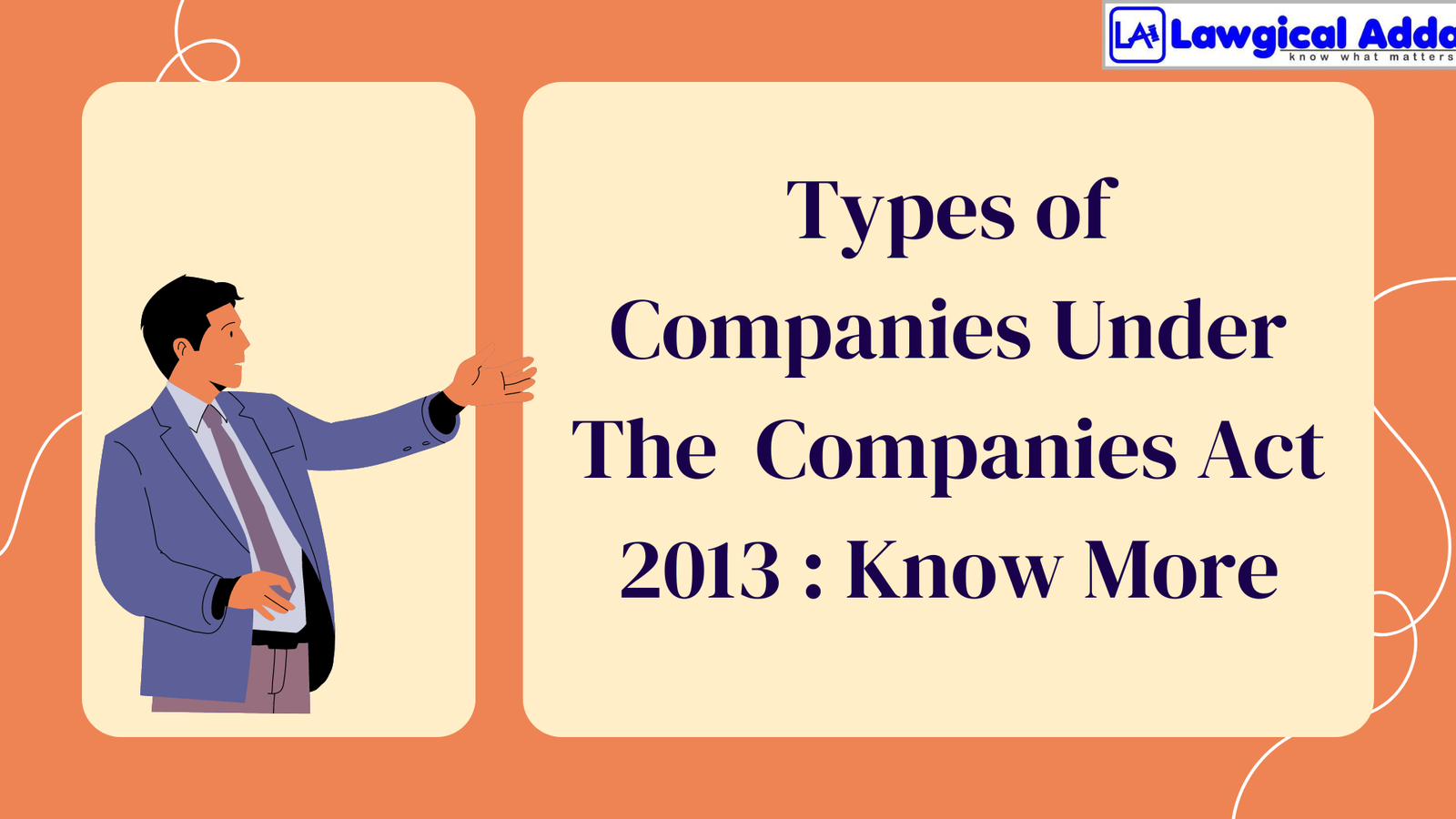Types of Companies Under The Companies Act 2013 : Know More

Table of Contents
Introduction
Do you intend to start your own business? You should be aware that India offers a wide variety of business types. According to the Companies Act 2013, a company can be classified according to its size, number of members, liability, control, ownership, and access to capital.
Sorting Businesses by Size
The Companies Act 2013 defines a Minor corporation in Section 2(85). The following requirements are satisfied:
- All shares must be fully paid and not exceed four crores of Indian rupees. The prior fiscal year sales couldn’t have above 40 crores of Indian rupees.
- Company status must not be that of a public company, section 8 company, holding company, subsidiary, or any other type of company that is listed under the Companies Act.
- The Companies Act of 2013 grants smaller businesses less or simplified compliance advantages to provide a more adaptable operating framework.
- A smaller company has less paperwork to worry about because it only has to plan two board meetings a year instead of four. Additionally, financial flexibility is provided by eliminating the need to declare cash flows at the end of the year.
- The approval process for the Director’s Remuneration Statement is made simpler by making it signable by either the Company Secretary or the Director.
Section 139(2) does not require specific information in the Auditor’s Report, and small corporations are not required to rotate auditors. Although compliance with Sections 92(5), 117(2), and 137(3) is mandatory, small businesses enjoy preferential treatment from regulators.
Large Corporation: A company is considered non-small if it does not fit the definition of a small business. They must comply with the provisions of the Companies Act and report their financial information regularly.
Companies are categorized according to their liabilities. There are essentially three distinct types of liability-based businesses:
The term “company limited by shares” describes a business structure where each partner’s personal responsibility is capped at the amount agreed upon in the partnership agreement.
But you can use the share’s unpaid balance to pay off the debt. Even in liquidation, a partner’s liability may be enforced so long as the business exists.
Limited liability companies: In the case of dissolution, the partners’ responsibility in this form of corporation is restricted to the amount they agree to contribute to the firm’s assets. To put it plainly, each shareholder’s guarantee amount in the partnership agreement limits their liability.
Limited liability companies: This rule applies to organizations that do not establish member liability. The members’ personal assets can be utilized to pay off the company’s debt, and their culpability is boundless. Their stock capital could be little or large.
In an unlimited company, the liability of the members is not limited. The members are personally liable for paying-off the company’s debts and obligations. Unlimited companies are relatively uncommon and are often formed for specific purposes or in niche sectors.
Kinds of Businesses Classified by Membership Count
Public Companies
A public company is defined in Section 2 (71) of the Companies Act of 2013. A minimum of seven partners are required to form a public business. One of its distinguishing features is that purchasing or selling shares of a public corporation is not limited. A public company’s shares are freely transferable, according to Section 58.
Individuals and businesses
A private corporation is defined as an association of individuals with no more than 200 members [Section 2(68)]. A privately held corporation can make no public offering of shares or debentures, and shares cannot be freely transferred in a private firm.
In accordance with the Companies Act 2012, Section 2(62) defines a sole proprietorship as a business entity in which just one individual is acting as a partner or shareholder. The board of directors must have at least one director, and that director need not be a board member.
Other kinds:
Holding Company
When one business owns shares in another, the resulting entity is called a holding company. It functions similarly to a parent corporation, with its subsidiaries as offshoots. If a holding firm has more than 50% ownership in another company or direct or indirect control over its board of directors, it is considered a holding.
Subsidiary Company
Another business, often called a parent or holding company, owns and controls a subsidiary. The parent business may own all of the shares in the subsidiary or just a portion of them. The term “wholly-owned subsidiary” describes a business relationship in which one company owns 100% of another.
Listed Company
Among the many forms of publicly traded corporations, one can find listed firms whose stock is available to the general public on the stock exchange.
Unlisted Company
Private individuals own and operate unlisted businesses since they are not traded on a stock exchange. These businesses cannot become capital investors since they cannot raise money openly.
By bypassing exchange laws, their shares trade “over the counter,” where the sale terms are customized to the buyers and sellers. There is greater operational control for unlisted enterprises.
Conclusion
Anyone thinking about starting a business in India would do well to familiarize themselves with the many different kinds of Indian companies. Each business structure has unique benefits and drawbacks.
These categories based on members, liability, size, control, capital availability, and ownership provide a clear road map for company structure.
Focus on what you do the best! Let Lawgical Adda handle the rest. Choose our services for easy winding-up, restructuring and surrendering of documents. Contact us today!
For more in-depth insights and detailed information on various legal topics, follow Lawgical Adda. Stay updated with the latest articles, expert analyses, and practical advice on corporate law, company regulations, and much more. Join our community and enhance your legal knowledge today!







